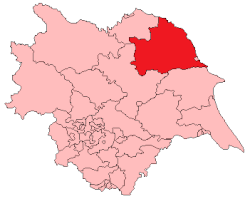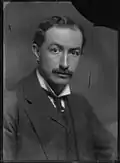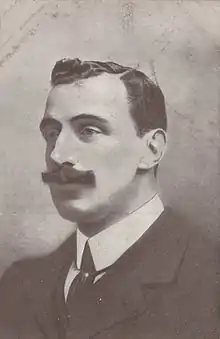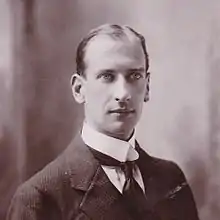| Whitby | |
|---|---|
| Former Borough constituency for the House of Commons | |
 Whitby in Yorkshire, 1885-1918 | |
| 1832–1885 | |
| Seats | One |
| Created from | Yorkshire |
| Replaced by | Whitby |
| 1885–1918 | |
| Seats | One |
| Type of constituency | County constituency |
| Created from | North Riding of Yorkshire and Whitby |
| Replaced by | Scarborough and Whitby and Thirsk and Malton |
Whitby was a parliamentary constituency centred on the town of Whitby in North Yorkshire. It returned one Member of Parliament (MP) to the House of Commons of the Parliament of the United Kingdom, elected by the first past the post system.
History
The constituency was created by the Great Reform Act for the 1832 general election as a parliamentary borough, Whitby being at that point one of the most prosperous towns in England which had not previously been represented. (Whitby had been summoned to send members to the Protectorate Parliaments during the Civil War period, but never at any other time.) It consisted of Whitby itself and the adjoining townships of Ruswarp, Hawsker and Stainsacre, and had a population of just over 10,000.
Whitby's shipbuilding industry had been in decline even before the new borough was established, and by 1885 a separate MP for the town could no longer be justified. However, when the borough was abolished the county constituency which absorbed it was also named Whitby (strictly, the Whitby Division of the North Riding of Yorkshire): it contained all the easternmost part of the Riding apart from Scarborough (which remained a separate borough), stretching south-west to Pickering which was the only other town in the constituency.
The Whitby division was abolished for the 1918 general election, when it was partially replaced by the new Scarborough & Whitby constituency.
Members of Parliament
| Election | Member | Party | |
|---|---|---|---|
| 1832 | Aaron Chapman | Tory[1] | |
| 1834 | Conservative[1] | ||
| 1847 | Robert Stephenson | Conservative | |
| 1859 by-election | Harry Thompson | Liberal | |
| 1865 | Charles Bagnall | Conservative | |
| 1868 | William Henry Gladstone | Liberal | |
| 1880 | Arthur Pease | Liberal | |
| 1885 | Ernest Beckett | Conservative | |
| 1905 by-election | Noel Buxton | Liberal | |
| 1906 | Gervase Beckett | Conservative | |
| 1918 | constituency abolished: see Scarborough and Whitby | ||
Election results
Elections in the 1830s
| Party | Candidate | Votes | % | ||
|---|---|---|---|---|---|
| Tory | Aaron Chapman | 217 | 61.0 | ||
| Whig | Richard Moorson[3] | 139 | 39.0 | ||
| Majority | 78 | 22.0 | |||
| Turnout | 356 | 84.4 | |||
| Registered electors | 422 | ||||
| Tory win (new seat) | |||||
| Party | Candidate | Votes | % | ±% | |
|---|---|---|---|---|---|
| Conservative | Aaron Chapman | Unopposed | |||
| Registered electors | 432 | ||||
| Conservative hold | |||||
| Party | Candidate | Votes | % | ±% | |
|---|---|---|---|---|---|
| Conservative | Aaron Chapman | Unopposed | |||
| Registered electors | 458 | ||||
| Conservative hold | |||||
Elections in the 1840s
| Party | Candidate | Votes | % | ±% | |
|---|---|---|---|---|---|
| Conservative | Aaron Chapman | Unopposed | |||
| Registered electors | 424 | ||||
| Conservative hold | |||||
| Party | Candidate | Votes | % | ±% | |
|---|---|---|---|---|---|
| Conservative | Robert Stephenson | Unopposed | |||
| Registered electors | 403 | ||||
| Conservative hold | |||||
Elections in the 1850s
| Party | Candidate | Votes | % | ±% | |
|---|---|---|---|---|---|
| Conservative | Robert Stephenson | 218 | 66.7 | N/A | |
| Whig | Edmund Phipps[4] | 109 | 33.3 | New | |
| Majority | 109 | 33.4 | N/A | ||
| Turnout | 327 | 72.0 | N/A | ||
| Registered electors | 454 | ||||
| Conservative hold | Swing | N/A | |||
| Party | Candidate | Votes | % | ±% | |
|---|---|---|---|---|---|
| Conservative | Robert Stephenson | Unopposed | |||
| Registered electors | 532 | ||||
| Conservative hold | |||||
| Party | Candidate | Votes | % | ±% | |
|---|---|---|---|---|---|
| Conservative | Robert Stephenson | Unopposed | |||
| Registered electors | 647 | ||||
| Conservative hold | |||||
Stephenson's death caused a by-election.
| Party | Candidate | Votes | % | ±% | |
|---|---|---|---|---|---|
| Liberal | Harry Thompson | 229 | 54.7 | New | |
| Conservative | Thomas Chapman[5] | 190 | 45.3 | N/A | |
| Majority | 39 | 9.4 | N/A | ||
| Turnout | 419 | 64.8 | N/A | ||
| Registered electors | 647 | ||||
| Liberal gain from Conservative | Swing | N/A | |||
Elections in the 1860s
| Party | Candidate | Votes | % | ±% | |
|---|---|---|---|---|---|
| Conservative | Charles Bagnall | 305 | 52.0 | N/A | |
| Liberal | Harry Thompson | 282 | 48.0 | N/A | |
| Majority | 23 | 4.0 | N/A | ||
| Turnout | 587 | 83.5 | N/A | ||
| Registered electors | 703 | ||||
| Conservative hold | Swing | N/A | |||
| Party | Candidate | Votes | % | ±% | |
|---|---|---|---|---|---|
| Liberal | William Henry Gladstone | 894 | 63.3 | +15.3 | |
| Conservative | Sir William Cayley Worsley, 2nd Baronet | 518 | 36.7 | −15.3 | |
| Majority | 376 | 26.6 | N/A | ||
| Turnout | 1,412 | 68.6 | −14.9 | ||
| Registered electors | 2,058 | ||||
| Liberal gain from Conservative | Swing | +15.3 | |||
Gladstone was appointed a Lord Commissioner of the Treasury, requiring a by-election.
| Party | Candidate | Votes | % | ±% | |
|---|---|---|---|---|---|
| Liberal | William Henry Gladstone | 779 | 56.7 | −6.6 | |
| Conservative | Sir William Cayley Worsley, 2nd Baronet | 596 | 43.3 | +6.6 | |
| Majority | 183 | 13.4 | −13.2 | ||
| Turnout | 1,375 | 66.8 | −1.8 | ||
| Registered electors | 2,058 | ||||
| Liberal hold | Swing | −6.6 | |||
Elections in the 1870s
| Party | Candidate | Votes | % | ±% | |
|---|---|---|---|---|---|
| Liberal | William Henry Gladstone | 873 | 53.7 | −9.6 | |
| Conservative | Charles Bagnall | 754 | 46.3 | +9.6 | |
| Majority | 119 | 7.4 | −19.2 | ||
| Turnout | 1,627 | 78.6 | +10.0 | ||
| Registered electors | 2,069 | ||||
| Liberal hold | Swing | −9.6 | |||
Elections in the 1880s
_001.jpg.webp)
| Party | Candidate | Votes | % | ±% | |
|---|---|---|---|---|---|
| Liberal | Arthur Pease | 1,072 | 60.5 | +6.8 | |
| Conservative | Robert Mowbray[6] | 699 | 39.5 | −6.8 | |
| Majority | 373 | 21.0 | +13.6 | ||
| Turnout | 1,771 | 81.9 | +3.3 | ||
| Registered electors | 2,163 | ||||
| Liberal hold | Swing | +6.8 | |||
At the 1885 election the constituency was redrawn to include Pickering and the hinterlands of Scarborough.
| Party | Candidate | Votes | % | ±% | |
|---|---|---|---|---|---|
| Conservative | Ernest Beckett-Denison | 5,049 | 51.7 | +12.2 | |
| Liberal | Arthur Pease | 4,709 | 48.3 | −12.2 | |
| Majority | 340 | 3.4 | N/A | ||
| Turnout | 9,758 | 86.0 | +4.1 | ||
| Registered electors | 11,350 | ||||
| Conservative gain from Liberal | Swing | +12.2 | |||
| Party | Candidate | Votes | % | ±% | |
|---|---|---|---|---|---|
| Conservative | Ernest Beckett | 5,078 | 56.3 | +4.6 | |
| Liberal | James Menzies Clayhills[10] | 3,940 | 43.7 | −4.6 | |
| Majority | 1,138 | 12.6 | +9.2 | ||
| Turnout | 9,018 | 79.5 | −6.5 | ||
| Registered electors | 11,350 | ||||
| Conservative hold | Swing | +4.6 | |||
Elections in the 1890s
| Party | Candidate | Votes | % | ±% | |
|---|---|---|---|---|---|
| Conservative | Ernest Beckett | 4,909 | 56.2 | −0.1 | |
| Liberal | H Frank Pyman | 3,826 | 43.8 | +0.1 | |
| Majority | 1,083 | 12.4 | −0.2 | ||
| Turnout | 8,735 | 80.8 | +1.3 | ||
| Registered electors | 10,804 | ||||
| Conservative hold | Swing | −0.1 | |||
| Party | Candidate | Votes | % | ±% | |
|---|---|---|---|---|---|
| Conservative | Ernest Beckett | Unopposed | |||
| Conservative hold | |||||
Elections in the 1900s
| Party | Candidate | Votes | % | ±% | |
|---|---|---|---|---|---|
| Conservative | Ernest Beckett | Unopposed | |||
| Conservative hold | |||||

| Party | Candidate | Votes | % | ±% | |
|---|---|---|---|---|---|
| Liberal | Noel Buxton | 4,547 | 52.6 | New | |
| Conservative | Gervase Beckett | 4,102 | 47.4 | N/A | |
| Majority | 445 | 5.2 | N/A | ||
| Turnout | 8,649 | 79.7 | N/A | ||
| Registered electors | 10,857 | ||||
| Liberal gain from Conservative | Swing | N/A | |||

| Party | Candidate | Votes | % | ±% | |
|---|---|---|---|---|---|
| Conservative | Gervase Beckett | 4,780 | 50.4 | N/A | |
| Liberal | Noel Buxton | 4,709 | 49.6 | N/A | |
| Majority | 71 | 0.8 | N/A | ||
| Turnout | 9,489 | 84.2 | N/A | ||
| Registered electors | 11,263 | ||||
| Conservative hold | Swing | N/A | |||
Elections in the 1910s

| Party | Candidate | Votes | % | ±% | |
|---|---|---|---|---|---|
| Conservative | Gervase Beckett | 5,161 | 52.9 | +2.5 | |
| Liberal | James Jardine | 4,602 | 47.1 | −2.5 | |
| Majority | 559 | 5.8 | +5.0 | ||
| Turnout | 9,763 | 87.2 | +3.0 | ||
| Registered electors | 11,200 | ||||
| Conservative hold | Swing | +2.5 | |||
| Party | Candidate | Votes | % | ±% | |
|---|---|---|---|---|---|
| Conservative | Gervase Beckett | 4,960 | 52.4 | −0.5 | |
| Liberal | Walter Herbert Septimus Pyman | 4,508 | 47.6 | +0.5 | |
| Majority | 452 | 4.8 | −1.0 | ||
| Turnout | 9,468 | 84.5 | −2.7 | ||
| Registered electors | 11,200 | ||||
| Conservative hold | Swing | −0.5 | |||
General Election 1914–15:
Another General Election was required to take place before the end of 1915. The political parties had been making preparations for an election to take place and by July 1914, the following candidates had been selected;
- Unionist: Gervase Beckett
- Liberal:
References
- 1 2 3 4 5 6 Stooks Smith, Henry (1845). The Parliaments of England, from 1st George I., to the Present Time. Vol II: Oxfordshire to Wales Inclusive. London: Simpkin, Marshall, & Co. p. 172. Retrieved 23 December 2018 – via Internet Archive.
- 1 2 3 4 5 6 7 8 9 10 11 12 13 14 Craig, F. W. S., ed. (1977). British Parliamentary Election Results 1832-1885 (e-book) (1st ed.). London: Macmillan Press. ISBN 978-1-349-02349-3.
- ↑ The Tourist: A Literary and Anti-slavery Journal, Volume 1. London: John Crisp. 1833. p. 16. Retrieved 30 April 2020 – via Internet Archive.
- ↑ "Whitby Election". Hull Packet. 9 July 1852. p. 8. Retrieved 22 July 2018 – via British Newspaper Archive.
- ↑ "To the Free and Electors of the Borough of Whitby". Whitby Gazette. 5 November 1859. p. 4. Retrieved 22 July 2018 – via British Newspaper Archive.
- ↑ "Whitby Borough Election". Whitby Gazette. 5 June 1880. p. 4. Retrieved 14 December 2017 – via British Newspaper Archive.
- 1 2 3 4 5 6 7 The Liberal Year Book, 1907
- ↑ Debrett's House of Commons & Judicial Bench, 1886
- 1 2 3 4 5 Craig, FWS, ed. (1974). British Parliamentary Election Results: 1885-1918. London: Macmillan Press. ISBN 9781349022984.
- ↑ "The General Election". Bristol Mercury. 8 July 1886. p. 8. Retrieved 14 December 2017 – via British Newspaper Archive.
- 1 2 Debrett's House of Commons & Judicial Bench, 1901
- 1 2 3 4 British Parliamentary Election Results 1885-1918, FWS Craig
- 1 2 Debrett's House of Commons & Judicial Bench, 1916